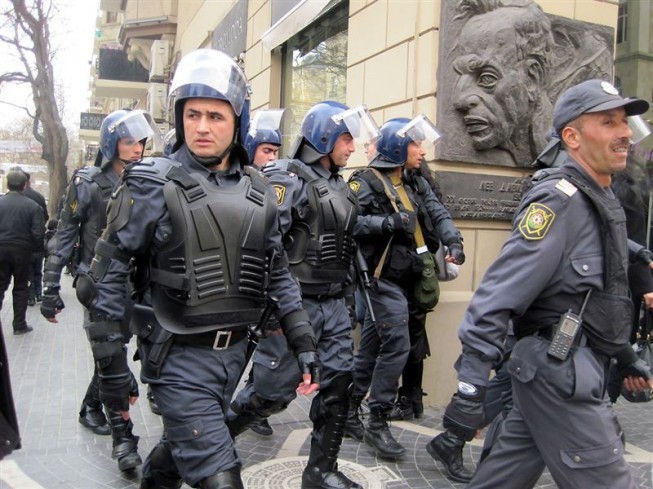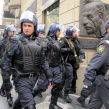
Bomb Plot Revealed in Baku
Publication: Eurasia Daily Monitor Volume: 9 Issue: 106
By:

On May 30, the Ministry of National Security (MNS) of Azerbaijan reported that two weeks earlier it had neutralized an armed group of Sunni Islamist militants who planned to kill the President of Azerbaijan and carry out bomb attacks during the Eurovision Song Contest. Azerbaijani special services detained 40 members of the group, and their leader, Vugar Padarov, was killed during the special operation (TURAN, May 30).
The official statement of the MNS gave other details of the plot. Reportedly, the group had planned (though never carried out) an assassination attempt on President Ilham Aliyev during his visit to the northwestern region of Azerbaijan in early April. Moreover, the members of the group were planning to bomb and carry out armed attacks on the Hilton-Baku and Marriott-Absheron hotels during the Eurovision song contest. The Investigation revealed that one of the terrorists, Timur Huseynov, was supposed to buy a ticket for the Eurovision concert and detonate a “shock bomb” inside Crystal Hall, the international music event’s venue. The resulting massive panic would have led to the deaths of many people. Simultaneously, several bombs were to be blown up in cars parked near the above-mentioned hotels (APA, May 30).
In preparation for this planned attack, two members of the group carried out reconnaissance work to determine the targets, including collecting floor plan schematics, working out the numbers and movements of staff in several state agency buildings, finding suitable sniper positions, and the other factors. The group was also planning to attack law-enforcement organizations, kill their staff, and seize arms and ammunition in the administrative buildings. To conceal its units, the armed group also considered preparing trench shelters in the mountainous areas and forests bordering on the Dagestani republic of the Russian Federation (APA, May 30).
During the anti-terror operation held on May 16, in Baku, one of the group members and a citizen of Azerbaijan, Huseynov Timur Ruslan, refused to surrender and was killed by the security forces. Two officers of the Ministry of National Security were also wounded during the operation. A leader of the gang, Saniyev Samir, nicknamed Abu Ubeyda and appointed emir, managed to escape during the action. Saniyev was later detained on the Azerbaijani-Georgian border (APA, May 30). It was also revealed that Vugar Padarov as well as two other members attended a meeting of the Council of Dagestan’s emirs held near the village of Kadar in Dagestan in February 2011. The Council gave relevant tasks and a large amount of money to the group. As a result of the mid-May arrests, the MNS confiscated 13 submachine guns; an “RPK” machinegun; different types of pistols; three carbines, 3,424 types of various caliber cartridges; 66 charges for machineguns and pistols; 23 “RGD-5”, 26 “F-1” and three “RG-42” hand grenades; as well as a large amount of grenade detonators. Additionally, the authorities found literature propagandizing terrorism and holy war, a great number of different ideas for attacks, specialized information for international terrorism, and toy-cars with explosive substances. Notably, the explosives would have been very difficult to detect, and could have been used in crowded places for maximum effect (News.az, May 30).
The revelation of the existence of this terrorist organization in Azerbaijan illustrated that the country is high on the agenda of certain extremist groups. It became obvious that not only Iran but also domestic radical groupings were furious at the fact that the Eurovision contest was being held in Baku. Eurovision thus provided an opportunity to try to destabilize the situation in Azerbaijan. To highlight this point, Iranian media reported earlier on a provocative statement issued by the Organization of Arab Mujahideen, which claimed that “the blood of sexual minorities will be spilled if the gay-parade takes place in Baku.” The same Iranian news sources claimed that the organization is closely related to al-Qaeda and operates in Central Asia and the Caucasus (Zerkalo, May 30). Neither Iranian nor Azerbaijani news sources were able to entirely clarify the origins of Organization of Arab Mujahideen, which had not previously been heard of. It is likely that the grouping was conjured by Iranian sources, which intended to aggravate the situation in Azerbaijan by spreading disinformation.
As for the terrorist group recently arrested inside Azerbaijan, information regarding its origins or affiliations is equally murky. Despite the recent severe downturn in Iranian-Azerbaijani relations, it is hard to see any connection between Shia Iran and the Sunni terrorist group. Iran does not usually support Sunni organization even if they are acting against Azerbaijan’s government. No evidence currently exists for a link between the group and Iranian special services. Usually, pro-Iranian groups receive the instructions in Iran, but to date they have never been involved in assassination attempts on the President of Azerbaijan. Furthermore, publicly available sources did not link the affiliation of the arrested group with any militant group in the region. State agencies also did not connect the plot with al-Qaeda or any other famous groups. Analysis of the available facts hints that the group members are likely homegrown radicals tightly connected with some unknown militant group in the North Caucasus. Future counter-terrorism operations in Azerbaijan may reveal more in due course.




